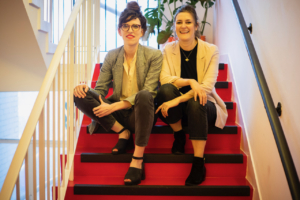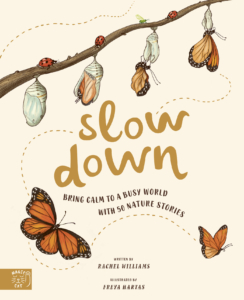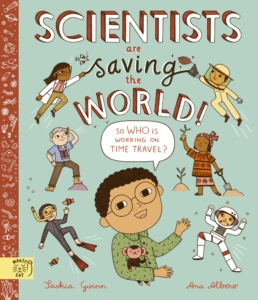Meet Magic Cat Publishing
Discover what motivated Rachel Williams and Jenny Bloom to set up Magic Cat Publishing in 2019 and what drives their current publishing programme. Visit https://www.magiccatpublishing.co.uk for more information.

Publishing non-fiction in the current climate
The first book we published back in March 2020 was Slow Down, written by Rachel and illustrated by Freya Hartas. The idea came when Rachel’s daughter, Violet, stopped her on the way to nursery to ask what was happening to a flower. They watched a bee hovering and Rachel realized that she didn’t have a book to explain how the process of pollination occurs… So she put together a list of things that that help you stop, look, and be amazed by the tiniest everyday things – how a butterfly emerges from a chrysalis; how dew collects on a leaf at dawn. A book was born and it has since turned into a wider series, with more than 500,000 copies in print.

We at Magic Cat are non-fiction specialists because we believe that learning and discovery, bringing real world subjects to children, are some of the best things families can do together around a printed page. When we set up Magic Cat in July 2019 as an illustrated non-fiction publisher, we already had a track record having set up both Big Picture Press and Wide Eyed Editions, but we wanted the opportunity for women to be running the business, and owning it. We set ourselves up with the goal to create beautiful children’s books that do more. We gently weave ideas that matter into stories that engage, entertain and bring joy. Ideas about kindness, togetherness, friendship, inclusivity. Ideas about the future of our planet, about culture, activism, and mindfulness.
And that idea of ‘doing more’ is important. Let’s take one example of how children need non-fiction’s ‘external force’. On Wednesday April 27 2022, the government’s social mobility commissioner, Katharine Birbalsingh, appeared before the Commons Science and Technology Committee to discuss diversity and inclusion in STEM subjects. When asked why fewer girls chose A-level physics, she stated “I just think they don’t like it. There’s a lot of hard maths in there that I think they would rather not do … the research generally … just says that’s a natural thing,” she added. “I don’t think there’s anything external.”
But research shows no cognitive biological differences between girls and boys in maths, so the idea of a male ‘maths brain’ is just not true. In an article published in the international Journal Nature in 2019, a study of 104 children from ages 3 to 10 found similar patterns of brain activity in boys and girls as they engaged in basic math tasks, providing fresh evidence that girls start out with the same maths abilities as boys. As Sage committee member Prof Catherine Noakes said, “Girls are so often told that mathematics, physics and engineering are not for them, and this is conditioned by society.”
The media we consume – and the books we read — profoundly affects an individual’s attitudes, behaviours, and beliefs. Albert Bandura’s work finds that individuals model their behaviour based on the behaviour of others, including fictional media characters… In short, girls and women internalise the stereotype of STEM as being for men, and this, coupled with experiences of gender bias from adults around them, discourages many from pursuing a STEM career.
As a publisher of children’s non-fiction, the discussion hits home. It reminded us how much work still needs to be done in rewriting the narrative on our bookshelves to celebrate the stories, achievements and invention. We have a duty beyond reading for pleasure to ensure that every child has the knowledge that they can reach their potential by seeing other people doing the same. The children’s illustrated non-fiction category has made huge strides in becoming more inclusive and reflective of society, there’s still work to be done, and we want to be part of that move forward.




